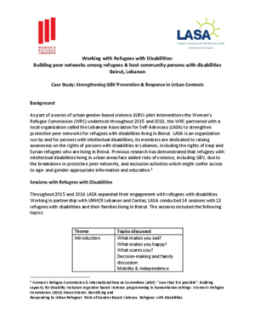
Beirut I: Strengthening Peer Networks for Refugees with Disabilities
PublishedInterventions for Strengthening GBV Prevention and Response for Urban Refugees
Previous research has demonstrated that refugees with intellectual disabilities living in urban areas face added risks of violence, including GBV, due to the breakdown in protective peer networks, and exclusion activities which might confer access to age- and gender-appropriate information and education. Throughout 2015 and 2016, the Women’s Refugee Commission (WRC) partnered with a local organization called the Lebanese Association for Self-Advocacy (LASA) to strengthen protective peer networks for refugees with disabilities living in Beirut. Sessions supported refugees with disabilities living in Beirut to reflect on safety issues, including how these might be different for women, men, girls and boys with disabilities, as well as how these might relate to nationality/country of origin. These sessions also helped to strengthen their protective peer networks in the community.

